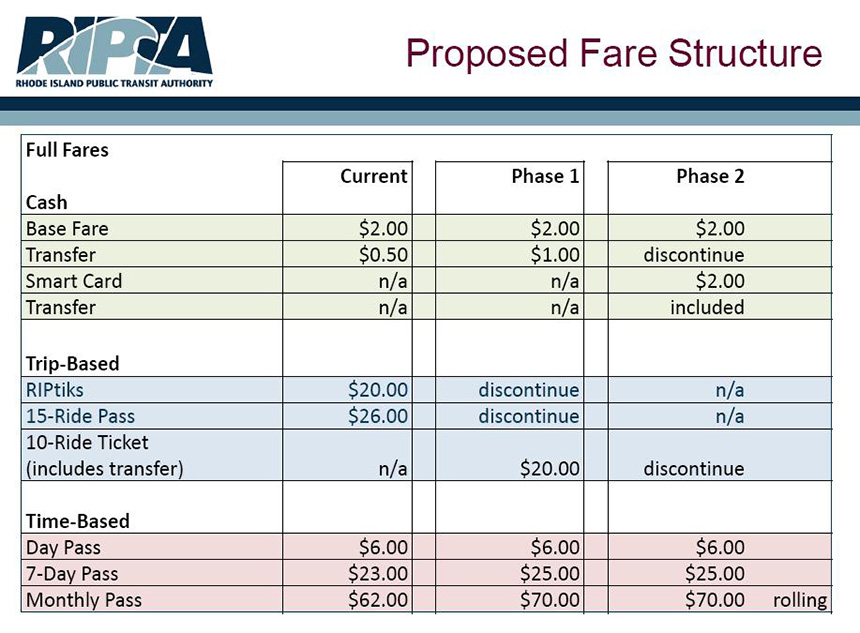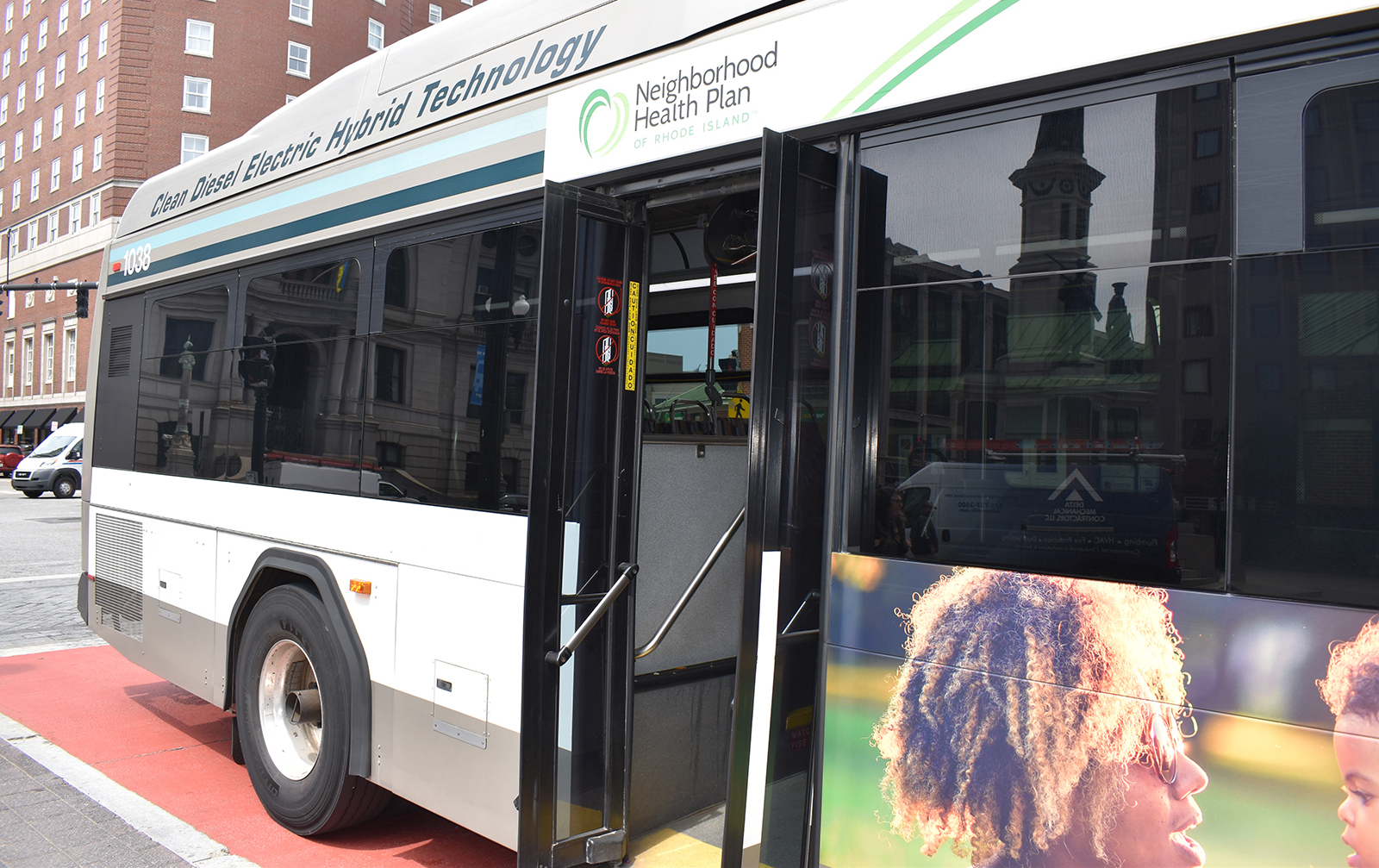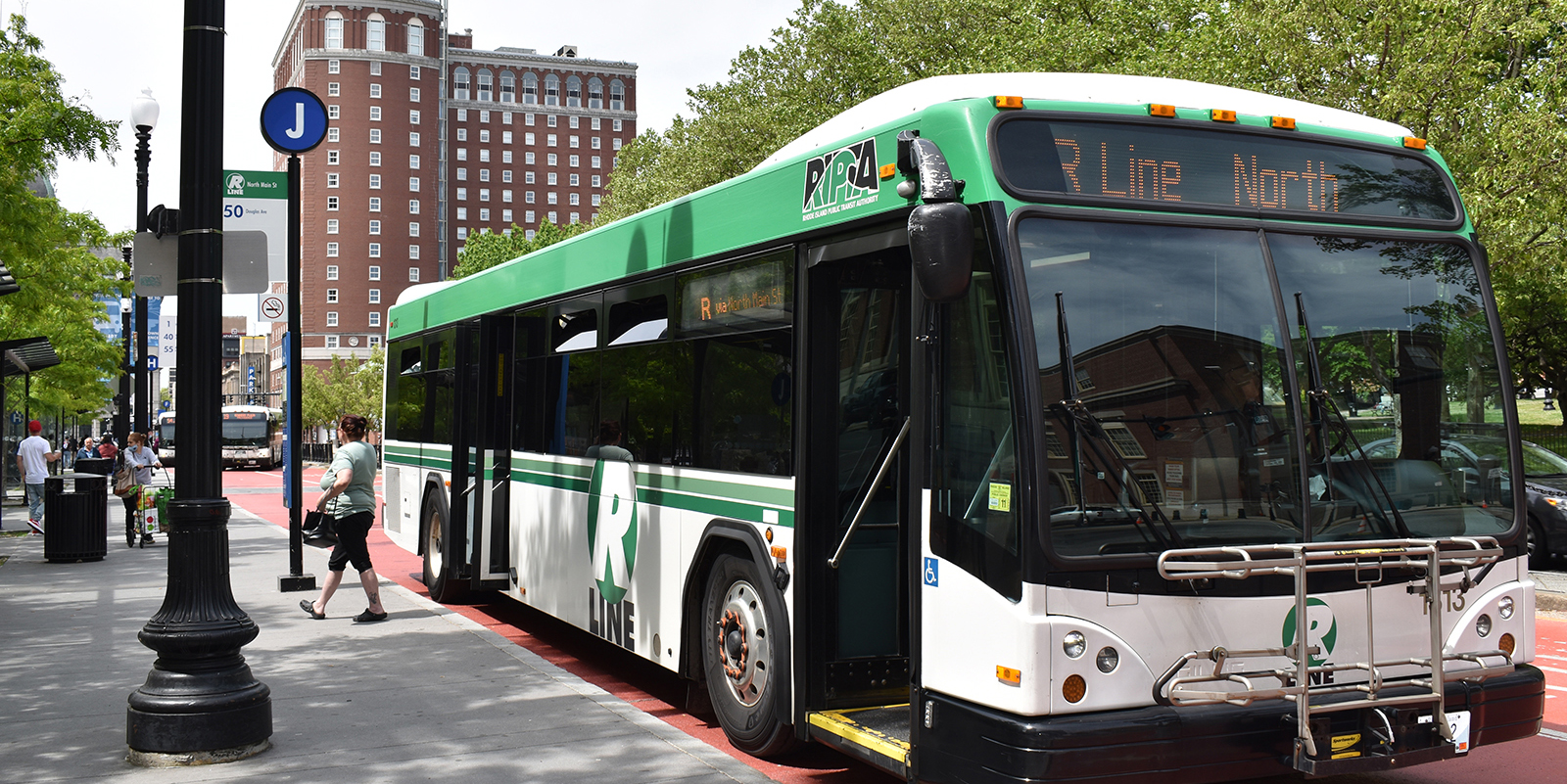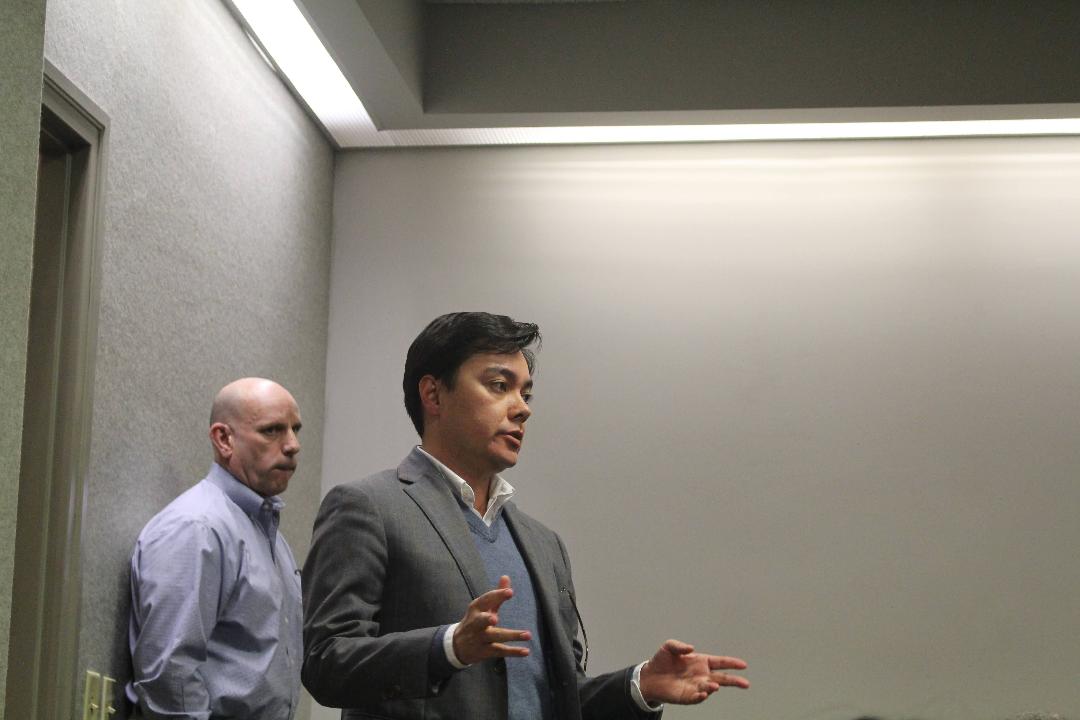Rhode Island Bus Fare Set to Get More Expensive
November 9, 2015
The Rhode Island Public Transit Authority (RIPTA) has officially proposed a new fare structure for riding the bus. The proposal, if adopted, would leave the $2 base fare unchanged, but would increase the cost of weekly and monthly passes. It would also require low-income seniors and people with disabilities to pay to ride the bus; currently, these groups ride free.
The proposed fare structure comes at the end of a months-long fare study conducted by RIPTA. The study aimed to research ways to simplify the set of fare products available to riders; implement new fare technologies, such as fare boxes, ticket vending machines and smart cards; incentivize riders to buy fare products that result in quicker boarding times; and maximize revenue from ridership to reduce the agency’s annual deficit.

The proposed fare structure would be implemented in two phases. The first phase would happen in early 2016, while the second would occur during the next two years as new fare technologies were implemented.
During the first phase, the base fare would remain $2, but a transfer would increase from 50 cents to a dollar. Both RIPtiks and the 15-ride pass would be eliminated, while a 10-ride ticket would be added. At $20, the cost of a 10-ride ticket would be equivalent to buying 10 single rides, but would include transfers.
The cost of a day pass would remain unchanged, at $6, while the cost of a 7-day pass would increase from $23 to $25, and the cost of a monthly pass would increase from $62 to $70.
Seniors, who currently ride the bus for free, would be required to pay 50 percent of the cost of each fare type — the maximum amount allowable under state law.
During the second phase, smart cards — plastic cards with a computer chip — would be added to the set of fare products available to riders. These cards could store a balance and be used to buy single rides, or could be used in place of a 1-day, 7-day or monthly pass.
Also during the second phase, all transfers would be discontinued, as would the 10-ride ticket. Monthly passes would be good for 30 days from the date of purchase, instead of a calendar month. Mobile payments — payments made through an app on a smartphone — would also be implemented in the second phase.
Before the proposed fare structure can be implemented, however, it must be presented at a series of public hearings and approved by RIPTA’s board of directors. Should the proposal be approved, the first phase would likely go into effect in early 2016.
Public hearings will be held in Warwick, Newport, Bristol, Providence, Pawtucket, Woonsocket and Wakefield between Nov. 17 and 20. Comments may be submitted by mail to RIPTA, Office of the CEO, 705 Elmwood Ave., Providence, RI, 02907, by e-mail at [email protected], or by calling 401-784-9500, ext. 101, by Dec. 1.
Balancing act
From the beginning, RIPTA’s fare study has been a contentious issue, especially among low-income seniors and people with disabilities who account for more than a quarter of the agency’s annual rides. Since 1975, RIPTA has been required by state law to subsidized the free-pass program for these populations, with little reimbursement from state government. At the end of the 2015 legislative session, a budget article passed that allows RIPTA to charge low-income seniors and people with disabilities up to half of the regular fare.
According to RIPTA, the burden of the free-pass program has become increasingly difficult to bear for the cash-strapped authority, and it has become necessary to ask all riders to contribute. The real value of each ride provided by RIPTA is calculated at $4.20 and rising — about 10 times the amount RIPTA is reimbursed by the state per ride for seniors and people with disabilities, according to Barbara Polichetti, the agency’s director of public affairs.
“Transportation is not a cost-less benefit,” she said, noting that RIPTA’s proposal to charge seniors and people with disabilities half of the regular fare is estimated to generate $3.5 million annually.
According to many transit advocates, however, low-income seniors and people with disabilities, many of whom survive on small, fixed incomes, can’t afford to pay to ride the bus — even at the proposed discounted rate. They say RIPTA’s proposal would leave people isolated and unable to meet their basic needs, such a shopping for groceries.
RITPA Riders Alliance, an advocacy group that represents a wide range of transit riders and their interests, developed three positions during the course of the fare study. It requested that the $2 base fare not be raised, that service cuts be avoided, and that any fare imposed on low-income seniors and people with disabilities not exceed 50 cents.
Alliance members flooded public meetings during the fare-study process to advocate for these positions. On Oct. 14, at a mid-morning public presentation in Providence about different fare modifications being considered by RIPTA, some 150 transit advocates attended to push back against the agency’s proposals to impose a fare on low-income seniors and people with disabilities. Tensions rose until the meeting erupted into a shouting match between angry audience members and RITPA’s moderator.
Transit advocates also rallied large numbers of people to board of directors meetings, where they gave testimony about the hardships that would be caused should RIPTA impose a fare on low-income seniors and people with disabilities.
While the $2 base fare isn’t in danger of increasing, and service cuts haven’t entered the conversation, RIPTA has proposed the maximum fare increase on low-income seniors and people with disabilities allowable under state law despite advocates’ sustained and vocal opposition.
“A sudden increase from zero to $1 is too much,” said Barry Schiller, an environmental and transit advocate and former RIPTA board member. “It is burdensome for too many, and it is above the average senior fare (charged by) comparable systems.”
Schiller, who believes RIPTA needs more revenue in order to realize a more robust bus system and its associated environmental benefits, said low-income seniors and people with disabilities should pay to ride the bus, but that the fare should be closer to 50 cents per ride.
While he is disappointed by RIPTA’s proposal, he isn’t surprised. Schiller said agency leadership has been clear that it wants the fare increase on low-income seniors and people with disabilities and he noted that it’s the “main revenue boost in the package.”
Don Rhodes, president of the RIPTA Riders Alliance, said lumping all seniors and people with disabilities into one group doesn’t work. “Some people cannot afford to pay anything to ride the bus. Period,” he said. He too generally advocated for a 50-cent fare.
He said seniors and people with disabilities who don’t ride frequently enough to make the $35 monthly pass logical will instead overexert themselves in order to do all of their errands in as few bus trips as possible.
Polichetti said there were many reasons RIPTA opted to propose the $1 fare, rather than a 50-cent or 75-cent fare. Revenue was one reason. According to Polichetti, about 30 percent of the rides taken by low-income seniors and people with disabilities can be paid for by Medicaid through Logisticare, a contractor hired by the state to manage the program. For the full list of more than 70 Medicaid eligible rides, click here.
The higher RIPTA sets the fare on low-income seniors and people with disabilities, the more reimbursement money comes to the agency from Medicaid. Polichetti said Rhode Islanders are paying into this federal program, so it makes sense to maximize the return on their investment.
Polichetti also noted that RIPTA’s current fare boxes handle paper money more effectively than they handle change. If the fare was set at 50 cents, the fare boxes would break more frequently, causing lost revenue in the form of missed fares and equipment maintenance.
Polichetti said a $1 reduced fare for seniors and people with disabilities would also allow RIPTA to avoid increasing the burden for people who are already paying to ride the bus.
“We had to consider the burden on paying customers, and whether we wanted to continue to place all the burden on them,” she said. “We are chartered to provide transportation for all of Rhode Island and that includes serving commuters, students. We strive for balance with all the populations we serve.”
More frustration
Another frustration of transit advocates is that the proposed fare structure excludes fare increases on express or long-distance routes. They say additional revenue from a fare increase on those routes could help offset, at least in part, the new fare imposed on low-income seniors and people with disabilities.
Polichetti said a fare increase on long-distance routes was left out of the proposal for a number of reasons, including the challenge of determining which routes would experience the increase and how to account for local riders on a long-distance route. She cited routes between Greenville and Providence and Newport and Providence that offer patches of important local service despite their long overall length.
“We didn’t want to inadvertently affect people who wanted to use their bus locally,” Polichetti said.
Schiller said determining which routes would experience fare increases and how to account for local riders traveling on a long-distance route would be complicated, but not insurmountable.
“There is a question of social equity,” he said. “With the phase 1 transfer increase, it can cost $3 to ride from Rhode Island Hospital to the Statehouse with a slow Kennedy Plaza transfer, but $2 to ride from Westerly to Providence.”
Rhodes said “this decision blew me away. RIPTA would ask people who have to count their change in order to ride the bus to pay more, but not charge the people riding the luxury routes more?”
He said this, more than anything else, illustrates that RIPTA is solving its deficit problem “on the backs of disabled people and seniors.” Rhodes suggested that on a route like the one between Providence and Newport one out of every three buses could be an express that bypasses local stops. This scenario, he said, would leave local service largely intact, while also offering a more rapid service for people making longer trips.
“People would pay an extra dollar for that,” Rhodes said.
Questions also have been raised by transit advocates about RIPTA’s decision to propose expanding the reduced-fare program to include all seniors instead of only low-income seniors. Advocates argue that doing so would reduce revenue and amount to a fare reduction for seniors who can afford to ride the bus and a simultaneous fare increase for those who can’t. A monthly pass, for example, would cost higher-income seniors $25 less — $35 instead of $60. It would cost low-income seniors $35 instead of zero.
Polichetti said RIPTA’s decision was based on analysis of ridership data, which determined that the administrative cost associated with imposing the income eligibility limit wasn’t worthwhile because so few higher-income seniors ride the bus.
“The overwhelming number of passengers who are elderly or have disabilities are indeed low-income, and the number that is not low-income is relatively negligible,” she said.
In 2014 for example, only 13,000 of 5.6 million trips made by seniors and disabled passengers were taken by seniors who didn’t qualify for free passes, according to Polichetti.
Rhodes said the RIPTA Riders Alliance will continue to oppose the proposed fare structure at the upcoming public meetings and at a planned Nov. 19 protest outside the Statehouse.
Rhodes believes many of RIPTA’s problems stem from the fact that riders are often unrepresented during the planning process for new programs and projects. He also is frustrated that none of the agency’s board members are regular riders. Rhodes has applied to be on the board three times, but hasn’t been selected.
“Very few people know more about RIPTA and the way it works than the riders do,” he said. “Members of RIPTA Riders Alliance have put the time and effort into knowing the facts. We can help find solutions that are right for RIPTA, the drivers and passengers.
“I want the process to work for both sides. No winners and no losers. But I feel like the respect has not been reciprocated by RIPTA over the last year or so.”
Categories
Join the Discussion
View CommentsRecent Comments
Leave a Reply
Your support keeps our reporters on the environmental beat.
Reader support is at the core of our nonprofit news model. Together, we can keep the environment in the headlines.
We use cookies to improve your experience and deliver personalized content. View Cookie Settings




While RIPTA may not currently have plans to raise the $2 fare, switching to a smart card system would make it much easier for them to do so. Once people get used to using smart cards, it wouldn’t be surprising if RIPTA started to raise it five or ten cents at a time.
While understandably imposing fares on the seniors and disabled now riding free has gotten the most attention, environmentalists who hope transit, (which in RI has a relatively very low share of commutes) can make more of a contribution to better land use and reducing emissions should also be concerned with the substantial increase in the monthly pass from $62 to $70. This raises the cost of the pass to 35 trips, well above the average of 32 trips for the cost of a pass I found in a survey of 20 bus systems.
This may not bring in much additional revenue as it will tip some into not buying a monthly pass, resulting in fewer trips taken by bus. It will also make it harder to market employer-based Ecopass sales which are already disappointingly low. Frequent riders are also hurt by increases in the weekly pass price and the loss of discounted multiride tickets. To speed boarding we should be increasing, not decreasing, the incentive for prepaying instead of paying cash fares. All this hurts prospects for making transit work more effectively for the environment.